|
De Nederlandse schrijver en cabaretier Kees van Kooten werd geboren op 10 augustus 1941 in Den Haag. Zie ook mijn blog van 10 augustus 2006 en ook mijn blog van 10 augustus 2007 en ook mijn blog van 10 augustus 2008 en ook mijn blog van 10 augustus 2009. xml:namespace prefix = o ns = "urn:schemas-microsoft-com:office:office" />
Uit: Dagboek van een rij-instrukteur (Het groot bescheurboek)
Maandag
Oude van Swieten opgehaald voor wekelijks uurtje Achteruit Parkeren. Grote genade: hoe lang geef ik die sul nou al les? Rechtsaf gaat nu wel, maar linksaf en parkeren nog hopeloos. Hij is ook zo doof als een kwartel. Maar geld geen probleem. Zwaait aan eind van les deur weer eens open zonder in achteruitkijkspiegel te hebben gekeken.
's Avonds fietser opgezocht in RK Ziekenhuis, met bloemetje namens Rijschool. Directie verzocht om grotere L die ik op dak kan zetten als ik met van Swieten les. Policy van direktie echter er zo min mogelijk leswagen-achtig uit te zien, wat publiek wil. Als we '83 in zijn geheel aan de hellingproef besteden, moet de man medio '85 af kunnen rijden. Morgen nieuwe leerling.
Donderdag
Ik ben voor het eerst van mijn leven verliefd op een leerlinge! Ik zet haar vóór van Swieten, want dat geeft me de energie om dat uur door te komen. Vanmorgen het voor de bocht terugschakelen met haar doorgenomen, waarbij steeds hand op haar hand kon leggen voor zogenaamd korrigeren versnellingshandle. Wil theorie met haar niet op zaak maar in auto zien te doen. Koud maar aanblazer aan en stationair draaien. Zij draagt geen beha, dat heb ik ook gezien. Onweerstaanbare vrouw! Stel drie lessen per week voor. Zij vindt dit goed!
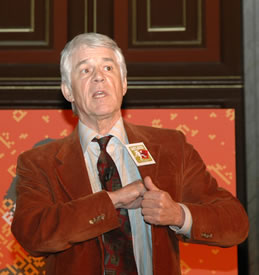
Kees van Kooten (Den Haag, 10 augustus 1941)
De Duitse schrijver Alfred Döblin werd op 10 augustus 1878 geboren in Stettin. Zie ook mijn blog van 10 augustus 2006 en ook mijn blog van 10 augustus 2007 en ook mijn blog van 10 augustus 2008 en ook mijn blog van 10 augustus 2009.
Uit: Berlin Alexanderplatz
Seine Nasenspitze vereiste, über seine Backe schwirrte es. «Zwölf Uhr Mittagszeitung
», «B. Z.», «Die neuste Illustrirte» , «Die Funkstunde neu«, «Noch jemand zugestiegen?« Die Schupos haben jetzt blaue Uniformen. Er stieg unbeachtet wieder aus dem Wagen, war unter Menschen. Was war denn? Nichts. Haltung, ausgehungertes Schwein, reiß dich zusammen, kriegst meine Faust zu riechen. Gewimmel, welch Gewimmel. Wie sich das bewegte. Mein Brägen hat wohl kein Schmalz mehr, der ist wohl ganz ausgetrocknet. Was war das alles. Schuhgeschäfte, Hutgeschäfte, Glühlampen, Destillen. Die Menschen müssen doch Schuhe haben, wenn sie so viel rumlaufen, wir hatten ja auch eine Schusterei, wollen das mal- festhalten. Hundert blanke Scheiben, laß die doch blitzern, die werden dir doch nicht bange machen, kannst sie ja kaputt schlagen, was ist denn mit die, sind eben blankgeputzt. Man riß das Pflaster am Rosenthaler Platz auf, er ging zwischen den andern auf Holzbohlen. Man mischt sich unter die andern, da vergeht alles, dann merkst du Strümpfen und Schuhen. Draußen bewegte sich alles, aber dahinter war nichts! Es lebte nicht! Es hatte fröhliche Gesichter, es lachte, nichts, Kerl. Figuren standen in den Schaufenstern in Anzügen, Mänteln, mit Röcken, mit wartete auf der Schutzilisel gegenüber Aschinger zu zweit oder zu
dritt, rauchte Zigaretten, blätterte in Zeitungen. So stand das da wie die Laternen und wurde immer starrer. Sie gehörten zusammen mit den Häusern, alles weiß, alles Holz.
Schreck fuhr in ihn, als er die Rosenthaler Straße herunterging und in einer kleinen Kneipe ein Mann und eine Frau dicht am Fenster saßen: die gossen sich Bier aus Seideln in den Hals, ja was war dabei, sie tranken eben, sie hatten Gabeln und stachen sich damit Fleischstücke in den Mund, dann zogen sie die Gabeln wieder heraus und bluteten nicht. Oh, krampfte sich sein Leib zusammen, ich kriege es nicht weg, wo soll ich hin ? Es antwortete: Die Strafe.
Er konnte nicht zurück, er war mit der Elektrischen so weit hierher gefahren, er war aus dem Gefängnis entlassen und mußte hier hinein, noch tiefer hinein.
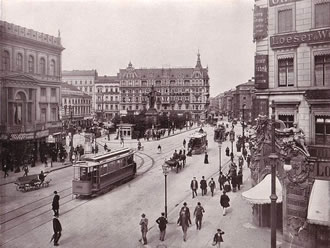
Alfred Döblin (10 augustus 1878 26 juni 1957)
De Alexanderplatz in 1903
De Oegandese schrijver Moses Isegawa (pseudoniem van Sey Wava) werd geboren op 10 augustus 1963 in Kawempe in Oeganda. Zie ook mijn blog van 10 augustus 2008 en ook mijn blog van 10 augustus 2009.
Uit: Abyssinian Chronicles
Serenity could not get over the way the Fiddler walked with legs wide apart. It would have been very impolite to ask the man why he walked that way, and Serenity feared that if he asked his children, they would tell their father, who in turn would report him to his father for punishment. Consequently, he turned to his aunt with the question "Why does the Fiddler have breasts between his legs?"
"Who said the Fiddler had breasts between his legs?"
"Have you never noticed the way he walks?"
"How does he walk?"
"With legs spread wide apart as if he were carrying two jackfruits under his tunic." He then gave a demonstration, very exaggerated, of the way the man walked.
"It is very funny, but I have never noticed it," Grandma said, humoring him the way adults did to get out of a sticky situation.
"How could you not have noticed? He has large breasts between his legs."
"The Fiddler has no breasts between his legs. He is ill. He has got mpanama."
Serenity's sisters somehow got wind of the duckwalk and could not resist telling their village peers and schoolmates about the Fiddler, his breasts, and the little clown who portrayed him in silly mimicries. As a result, Serenity got the nickname Mpanama, a ghastly sounding word used out of adult hearing that dropped from gleeful lips with the wet slap of dung hitting hard ground from the rear of a half-constipated cow. Once again he was cured of an obsession, though he continued with his visits to the poor man's home, faintly hoping to catch him pissing or, better still, squatting on the latrine, for he really wanted to see if the Fiddler's breasts were as large and smooth as those of the women in his father's homestead.
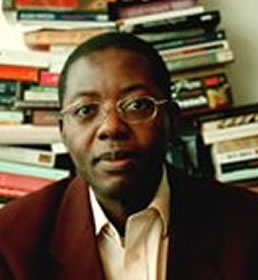
Moses Isegawa (Kawempe, 10 augustus 1963)
De Amerikaanse dichter en schrijver Mark Doty werd geboren op 10 augustus 1953 in Maryville, Tennessee. Zie ook mijn blog van 10 augustus 2009.
At the Gym
This salt-stain spot
marks the place where men
lay down their heads,
back to the bench,
and hoist nothing
that need be lifted
but some burden they've chosen
this time: more reps,
more weight, the upward shove
of it leaving, collectively,
this sign of where we've been:
shroud-stain, negative
flashed onto the vinyl
where we push something
unyielding skyward,
gaining some power
at least over flesh,
which goads with desire,
and terrifies with frailty.
Who could say who's
added his heat to the nimbus
of our intent, here where
we make ourselves:
something difficult
lifted, pressed or curled,
Power over beauty,
power over power!
Though there's something more
tender, beneath our vanity,
our will to become objects
of desire: we sweat the mark
of our presence onto the cloth.
Here is some halo
the living made together.
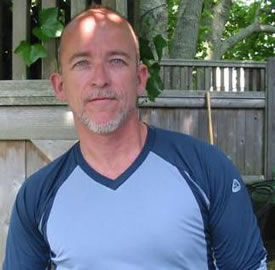
Mark Doty (Maryville, 10 augustus 1953)
De Poolse schrijver Jerzy Pilch werd geboren op 10 augustus 1952 in Wisla. Zie ook mijn blog van 10 augustus 2009.
Uit: A Thousand Peaceful Cities (Vertaald door David Frick)
The parchment map of the sky slowly took on life. Streams of deep blue air flowed across it. Golden sand poured from the planets. Within the large constellations you could hear music. I awoke in the middle of the night, and in the dark, gropingly, I recorded in my notebook the word occupation, which in a moment someone would whisper in the depths of the sleeping house.
In those days I never parted for a moment with my pencil and notebook. The desire, stronger than anything else, to record words and sentences that had just been or would in a moment be uttered, directed my every step, waking and sleeping. I would place the notebook and pencil on the nightstand, and when the golden-black grandfather clock in the entryway rang out the most terrible of hours, two or three in the morning, when the Antichrist himself touched my featherbed with a wet wing, when during every season of the year an infernal silence reigned, I would reach for notebook and pencil and record the word or sentence that brought relief. Ocupation, I wrote, but I didnt feel relief or consolation. From the kitchen came noises unusual for that hour. Someone was moving a chair. Someone knocked delicately, probably at the window, since the panes rattled. Someone said something. Somebody answered. I lit the lamp, and Mr. Trąbas voice became more distinct, as if intensified by the light. To this day I am absolutely certain that, throughout my entire childhood, I was awakened from sleep either by Mr. Trąbas voice, or by the sound of the Wittenberg bells in the church tower.
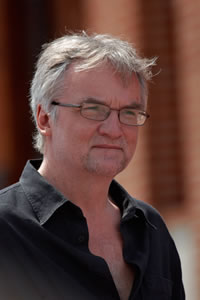
Jerzy Pilch (Wisla, 10 augustus 1952)
Zie voor nog meer schrijvers van de 10e augustus ook mijn vorige blog van vandaag.
|



